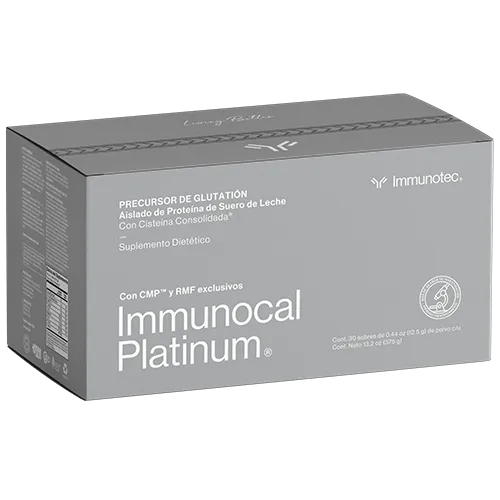



What is Immunocal?
Immunocal is an all-natural protein derived from milk. It is a specially prepared whey protein isolate.
If someone is lactose intolerant, can they take Immunocal?
Yes, the lactose in Immunocal is eliminated during its production. Less than 1% of lactose remains and the product can legally be called “low lactose”. Keep in mind that being lactose intolerant is different from being allergic to milk protein (see below).
If someone is allergic to milk, can they take Immunocal?
Most people who claim to be “allergic” to milk really aren't, they are lactose intolerant. If this is the case, they can take Immunocal. If you are truly allergic to milk proteins, you should avoid its consumption. However, the majority of milk protein allergies (80%) are due to a protein called “casein.” Immunocal contains very little casein (generally less than 1.5%)
What is “serum”?
Whey is a group of proteins found in milk.
What is a whey protein “isolate”?
Whey proteins can be produced in different concentrations. “Regular” whey protein can have a concentration of between 20% and 70%. Whey protein “concentrates” have a concentration between 70% and 90%. A whey protein “isolate” has a concentration above 90% pure protein. Technically this is difficult and expensive to achieve without damaging the protein structure.
How is the manufacturing of Immunocal different from other whey proteins?
Immunotec's unique manufacturing process preserves the critical disulfide bonds in the glutathione precursor cysteine. By releasing this delicate protein into the cell, it allows the body to produce glutathione and maximize immune system levels. Other whey proteins are generally manufactured using high temperatures (pasteurization) and violent mixing methods, resulting in a denatured and ineffective product.
What does undenatured mean?
Undenatured means that a protein is not damaged or has not significantly changed its natural state. Immunocal works by providing the cell with the main precursors of glutathione. It is of utmost importance that during the manufacturing and mixing processes these precursors remain intact, or undenatured, so that they can function in the immune system. For this reason, in order for Immunocal to retain its bioactive effectiveness, we recommend not heating or subjecting the product to abrupt mixing procedures.
Do other whey protein isolates work?
As a source of amino acids, whey protein has a superior nutritional advantage over other types of proteins. All whey protein isolates are a good source of protein. However, there are many other variables that must be taken into account when analyzing whey quality. What is most important is the degree to which the protein retains its original natural form. This is easily altered in the harvesting, manufacturing, packaging, packaging, shipping and quality control of the product. Other whey protein isolates have not been extensively tested in human clinical trials, so no one can say for sure whether they work or not.
What does Immunocal do?
Immunocal is a natural source of the glutathione precursor cysteine for maintaining a strong immune system.
How does Immunocal work?
Immunocal provides the unusual building blocks (precursors) that cells need to produce glutathione.
Immunocal provides all the essential amino acids that the body and tissues require.
Immunocal provides the other peptides (small proteins) essential for many aspects of health.
What is glutathione?
It is a substance produced by our own cells that is essential for life. Glutathione performs many functions, some of the most important are:
It is the body's master antioxidant.
Glutathione plays a determining role in the proper functioning of the immune system.
Why can't a person just eat glutathione?
Glutathione is broken down with digestion and very little can make it from your mouth to your cells, where it is needed. To raise glutathione effectively, you must provide your cells with the building blocks (precursors) so you can produce glutathione.
How have the benefits of Immunocal been proven? How do we know it works?
How have the benefits of Immunocal been proven? How do we know it works?
What is a “peer-reviewed” publication?
“Peer-reviewed” means that an article is analyzed and critiqued for quality and validity by other doctors and scientists before it can be published. Articles that do not pass this scrutiny are rejected. Most articles are initially rejected. In this process, erroneous or inaccurate statements are searched.
How many articles have been published about Immunocal?
The number of articles grows every year. Since the summer of 2012, more than 35 articles have been published.